UK Attitudes Towards Women in Golf 2023

Are attitudes towards women in golf changing?
It’s undeniable that attitudes towards women in sport are shifting. The Lionesses’ triumph in 2022’s European Football Championships, for example, signalled a level of interest and excitement towards women’s football that had previously not been seen in the UK.
But when it comes to women’s
golf in the UK, how much inequality still lingers? How rife is everyday sexism,
both at a professional and a grassroots level? Do girls feel truly empowered to
take up—and stick with—golf from a young age?
Ultimately, are we making any headway when it comes to championing women in the game of golf?
Women in golf: the research
We carried out a nationally representative
survey of 2,011 UK residents across golf and 21 other sports, looking at opinions
on a range of issues, from the role of female pundits to how often Brits watch
women’s golf on TV.
We also delved into long-held stereotypes of what constitutes a “male” vs. a “female” sport and explored why one in five men has played golf in their lifetime compared to only 7% of women.
Inequality in women’s golf
Overall, survey respondents acknowledged
that, in general, inequality exists within the game, with 77% of people
agreeing this is the case.
Interestingly, though, 80% of women said there is inequality, vs 74% of men, showing differing perceptions even amongst those who agree there is an issue.
Women in golf: viewing habits
More than a quarter (28%) of men
told us they have watched men’s golf, compared to just 11% of men who have
watched women’s golf. Just 12% of people, male and female, have watched women’s
golf.
Almost half (45%) of all people, and 60% of men, say they generally prefer to watch men’s sport than women’s. Just one in 10 people have watched the women’s PGA tour compared to a quarter of people who have watched the men’s version.
When asked about major golf tournaments,
55% of those surveyed said there should be a female version of the Masters.
However, one in 10 men disagree, arguing that the Masters should be a men’s
only golf competition.
And it’s not just women out on the fairways who are discriminated against. Almost one in 10 people said that the opinions of female pundits are less valid than that of their male counterparts. This view was most prevalent among survey respondents aged 55 and over.
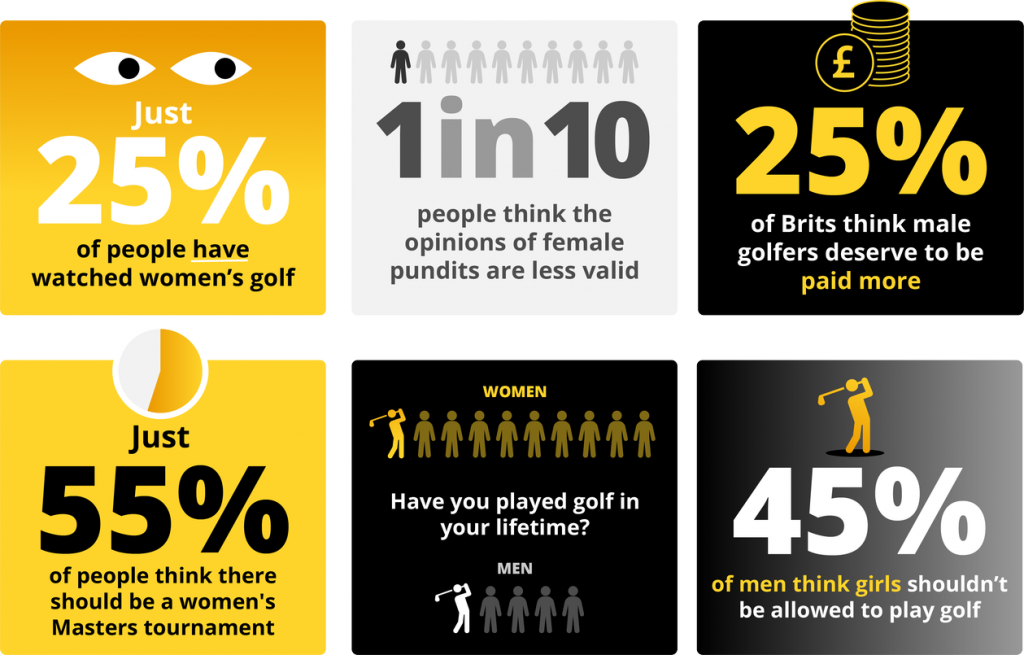
The gender pay gap
Although recent BBC analysis found that 83% of sports now reward men and women equal prize money, a significant gender pay gap still exists, and runs into the tens of millions for some sports.
According to PGA data, the world’s highest paid male golfer is Phil Mickelson, who earned an eye-watering $138m (£114.6m) in 2022. You’ll find much smaller pay packets in the women’s game. For example, the highest paid professional female golfer in 2022 was Minjee Lee, who took home a total of $7.3m (£6m).
In addition, in the Forbes 2022 Highest Paid Athletes List, just two women—Naomi Osaka and Serena Williams – made the top 50.
Despite this clear discrepancy between men and women doing the same job, a quarter of people we surveyed agreed that male golfers deserve to be paid more than female ones. This rises to 35% amongst men.
Inequality in grassroots golf
With discussions around women in
professional sport now much higher on the agenda, it can be easy to forget the
importance of encouraging female participation in sport at grassroots level.
Whether at amateur level, in a
local league or just amongst friends as a hobby, getting active through sports
like golf plays a vital role in maintaining good public health—both physical
and mental. A thriving grassroots scene has also been proven to deliver a range
of benefits to society, bringing people together and building community spirit.
However, we found that men are disproportionately playing golf in their day-to-day lives, with 20% of men having played the sport in their lifetime vs just 7% of women.
Why are people put off playing golf?
To dig into this statistic a little
deeper, we asked people why are put off playing. Around six in 10 (64%) of
women said that it just “isn’t their thing”, with far fewer men (41%) giving
this reason.
A quarter of people stated that their
fitness levels hold them back from playing sport, with a lack of
self-confidence, time and disposable income also cited as reasons for a lack of
participation. Unfortunately, of course, physical sport isn’t always available
to all, with almost 10% of people saying they have a disability which prevents
them from playing.
One in seven people told us that they were never encouraged to play sport in school, so they haven’t played as an adult, highlighting the crucial role that school-age sport has to play in our lifelong participation levels.
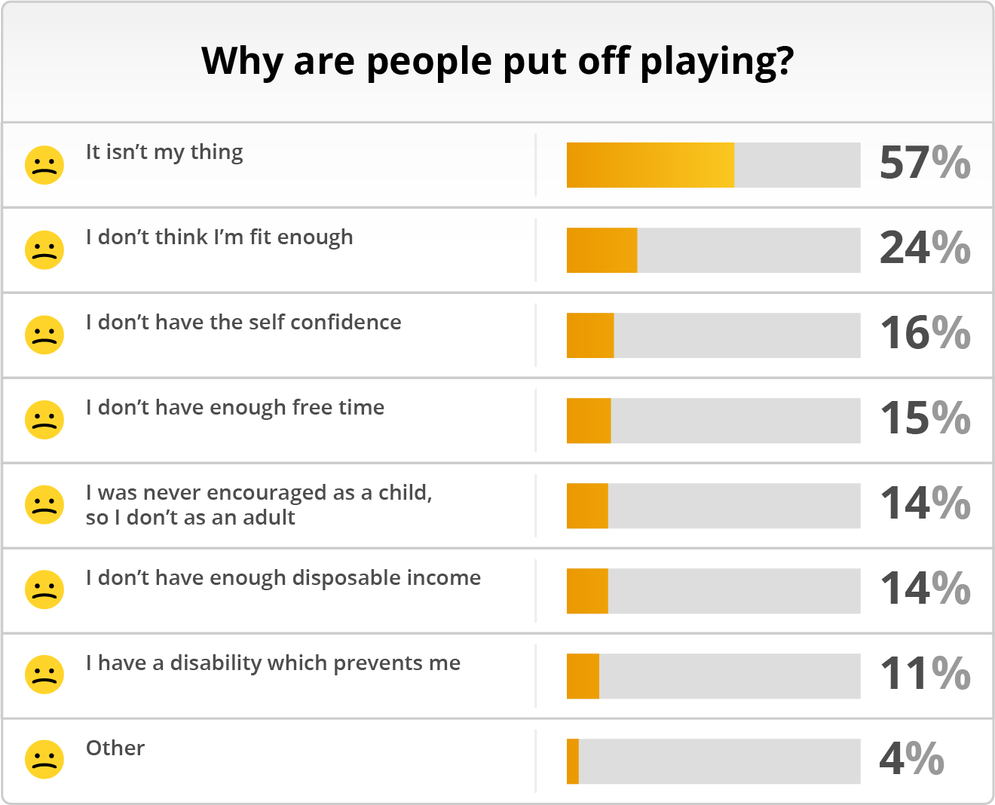
Inequality at school
Lastly, our survey explored the level of gender inequality amongst school-age children. We found that 70% of women and 55% of men believe girls face barriers when it comes to participation in golf.
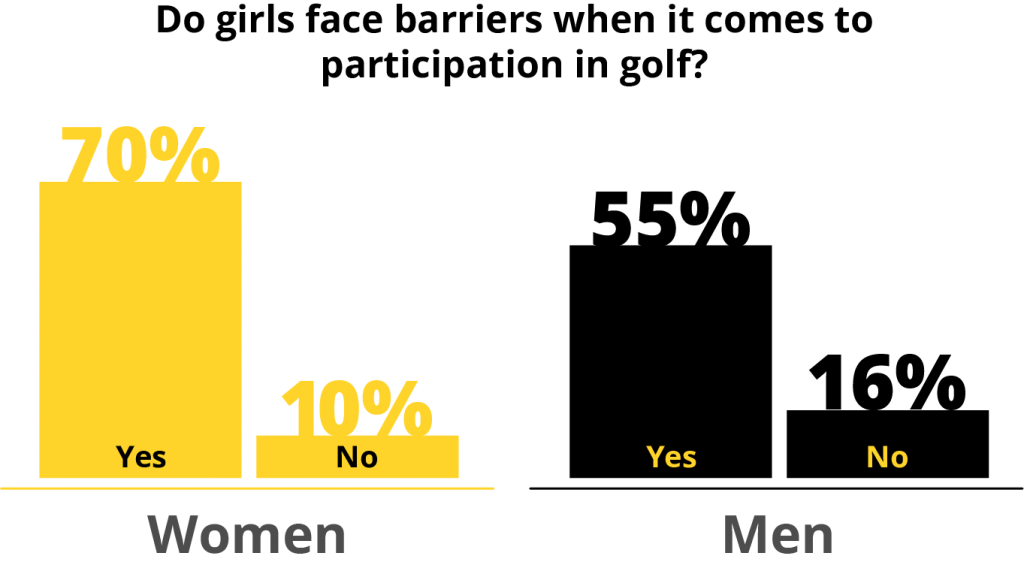
There’s also a clear difference between
the number of men who have consider golf either as a hobby or a career choice
compared to women. Nearly a third (30%) of men have considered playing golf as
a regular hobby, while one in 10 has also considered a career in professional
golf.
As for women, just 14% have considered playing golf as a hobby, with almost no women saying they have considered it as a career.
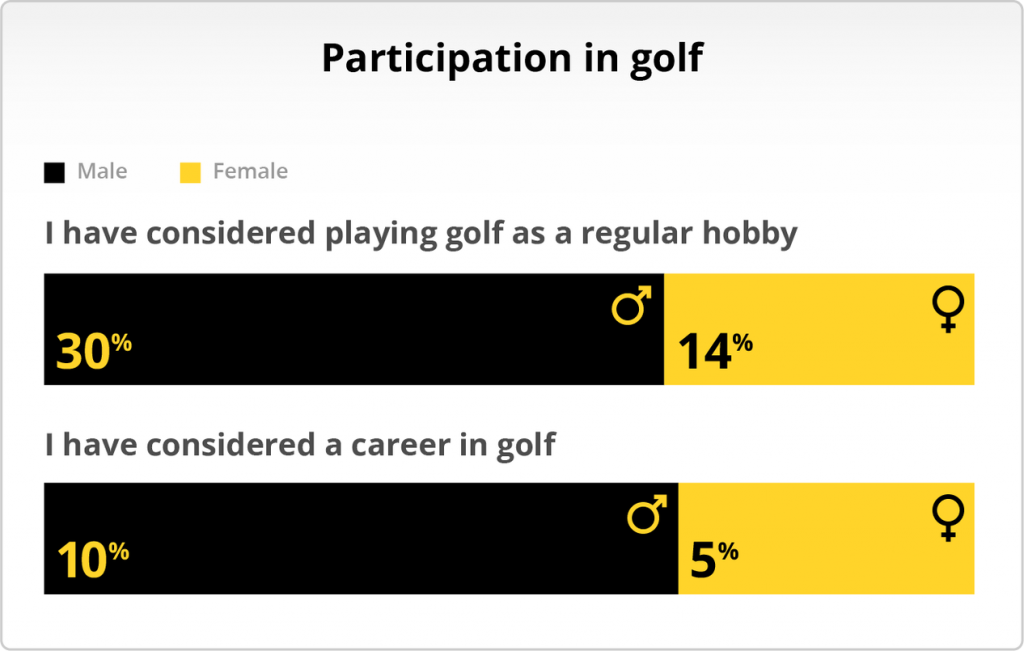
Where do girls face the biggest barriers to participation in golf?
Interestingly, there were differing views on this topic across regions of the UK. When asked “Do girls face barriers to participation in sport?”, 75% of respondents in Northern Ireland said yes. This was followed by 62% of people in the South East and 58% of people in the North East. Just 44% and 45% of people said yes in Wales and Scotland, respectively, pointing to a potentially more inclusive culture for girls’ sport in those areas.
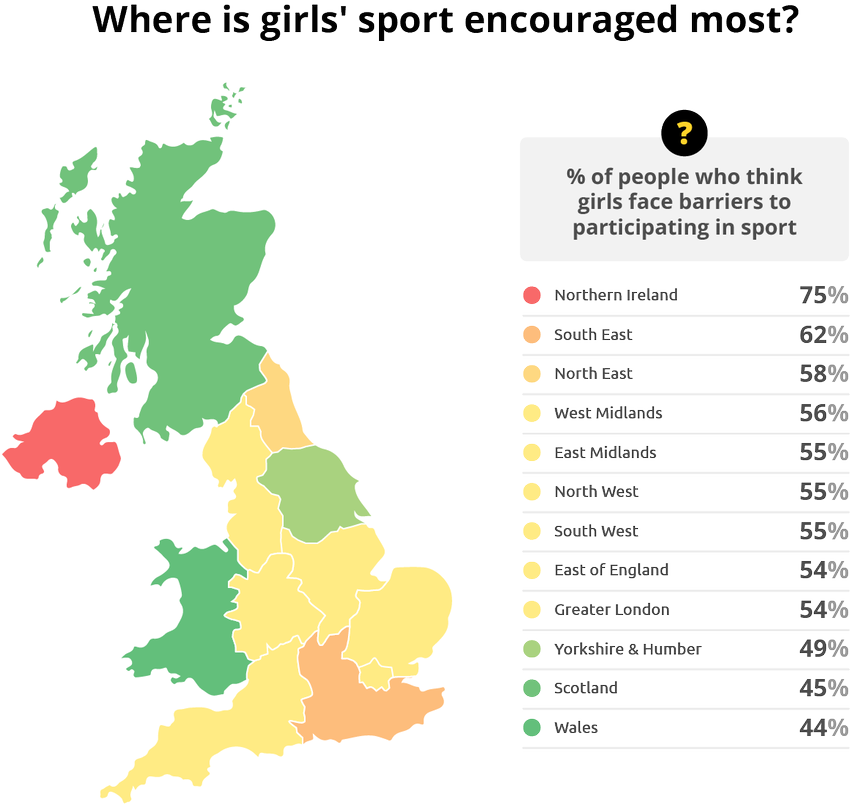
Should girls be allowed to play golf?
We also uncovered some surprising and
outdated opinions around which sports “should” be played by boys and girls.
Around half (49%) of people stated that some sports are more naturally suited
to men than women, with just 35% of those surveyed agreeing that women have the
potential to be as good, or better, than men at most sports.
One in seven men surveyed (14%) think women and girls shouldn’t play golf, with this view perhaps surprisingly more likely to be cited among younger generations. A fifth of 16–24-year-olds don’t think women should play golf, compared to just 6% of people aged 55+.
Summary
What’s evident throughout our
research is that, despite some solid progress being made regarding attitudes
towards women in golf and wider sport, true parity is still a long way off.
Championing positive role models, pushing for greater visibility, and delivering more output on TV will all support the advancement of women’s golf across the UK.
Methodology
Golf Care surveyed a nationally representative panel of 2,011 UK residents in January 2023 and analysed their responses.
Women in golf: related articles
The 11 best women’s golf polo shirts
7 female golfing health benefits
The 9 best golf gilets for ladies








